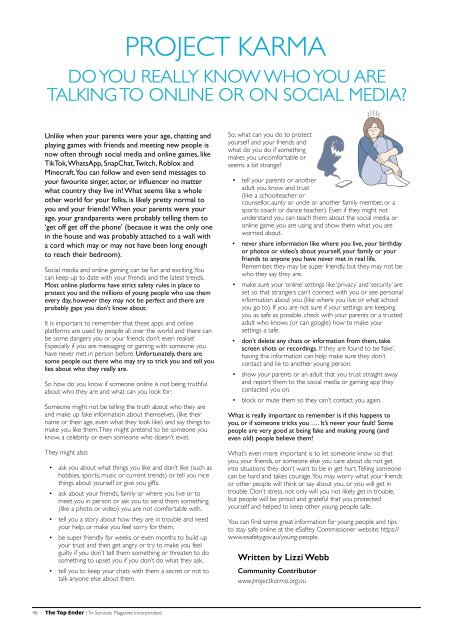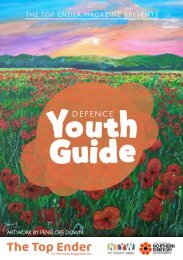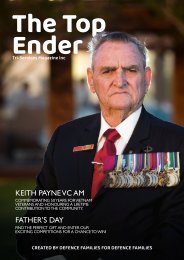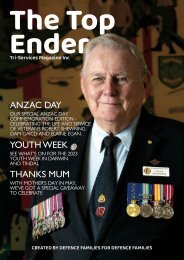The Top Ender Magazine June July 2023 Edition
This edition of The Top Ender Magazine includes competitions, feature interviews, support articles and more. We interviewed Betty Klimenko AM and have Darwin Triple Crown V8 tickets to give away! Find help and resources that support you to make the most out of your time in the top end of Australia, servicing Darwin, Katherine, Tindal and Pilbara regions.
This edition of The Top Ender Magazine includes competitions, feature interviews, support articles and more. We interviewed Betty Klimenko AM and have Darwin Triple Crown V8 tickets to give away! Find help and resources that support you to make the most out of your time in the top end of Australia, servicing Darwin, Katherine, Tindal and Pilbara regions.
Create successful ePaper yourself
Turn your PDF publications into a flip-book with our unique Google optimized e-Paper software.
PROJECT KARMA<br />
DO YOU REALLY KNOW WHO YOU ARE<br />
TALKING TO ONLINE OR ON SOCIAL MEDIA?<br />
Unlike when your parents were your age, chatting and<br />
playing games with friends and meeting new people is<br />
now often through social media and online games, like<br />
TikTok, WhatsApp, SnapChat, Twitch, Roblox and<br />
Minecraft. You can follow and even send messages to<br />
your favourite singer, actor, or influencer no matter<br />
what country they live in! What seems like a whole<br />
other world for your folks, is likely pretty normal to<br />
you and your friends! When your parents were your<br />
age, your grandparents were probably telling them to<br />
‘get off get off the phone’ (because it was the only one<br />
in the house and was probably attached to a wall with<br />
a cord which may or may not have been long enough<br />
to reach their bedroom).<br />
Social media and online gaming can be fun and exciting. You<br />
can keep up to date with your friends and the latest trends.<br />
Most online platforms have strict safety rules in place to<br />
protect you and the millions of young people who use them<br />
every day, however they may not be perfect and there are<br />
probably gaps you don’t know about.<br />
It is important to remember that these apps and online<br />
platforms are used by people all over the world and there can<br />
be some dangers you or your friends don’t even realise!<br />
Especially if you are messaging or gaming with someone you<br />
have never met in person before. Unfortunately, there are<br />
some people out there who may try to trick you and tell you<br />
lies about who they really are.<br />
So how do you know if someone online is not being truthful<br />
about who they are and what can you look for:<br />
Someone might not be telling the truth about who they are<br />
and make up fake information about themselves, (like their<br />
name or their age, even what they look like) and say things to<br />
make you like them. <strong>The</strong>y might pretend to be someone you<br />
know, a celebrity or even someone who doesn’t exist.<br />
<strong>The</strong>y might also:<br />
• ask you about what things you like and don’t like (such as<br />
hobbies, sports, music or current trends) or tell you nice<br />
things about yourself or give you gifts.<br />
• ask about your friends, family or where you live or to<br />
meet you in person or ask you to send them something<br />
(like a photo or video) you are not comfortable with.<br />
• tell you a story about how they are in trouble and need<br />
your help, or make you feel sorry for them.<br />
• be super friendly for weeks or even months to build up<br />
your trust and then get angry or try to make you feel<br />
guilty if you don’t tell them something or threaten to do<br />
something to upset you if you don’t do what they ask.<br />
• tell you to keep your chats with them a secret or not to<br />
talk anyone else about them.<br />
So, what can you do to protect<br />
yourself and your friends and<br />
what do you do if something<br />
makes you uncomfortable or<br />
seems a bit strange?<br />
• tell your parents or another<br />
adult you know and trust<br />
(like a schoolteacher or<br />
counsellor, aunty or uncle or another family member, or a<br />
sports coach or dance teacher). Even if they might not<br />
understand you can teach them about the social media or<br />
online game you are using and show them what you are<br />
worried about.<br />
• never share information like where you live, your birthday<br />
or photos or video’s about yourself, your family or your<br />
friends to anyone you have never met in real life.<br />
Remember, they may be super friendly, but they may not be<br />
who they say they are.<br />
• make sure your ‘online’ settings like ‘privacy’ and ‘security’ are<br />
set so that strangers can’t connect with you or see personal<br />
information about you (like where you live or what school<br />
you go to). If you are not sure if your settings are keeping<br />
you as safe as possible, check with your parents or a trusted<br />
adult who knows (or can google) how to make your<br />
settings a safe.<br />
• don’t delete any chats or information from them, take<br />
screen shots or recordings. If they are found to be ‘fake’,<br />
having this information can help make sure they don’t<br />
contact and lie to another young person.<br />
• show your parents or an adult that you trust straight away<br />
and report them to the social media or gaming app they<br />
contacted you on.<br />
• block or mute them so they can’t contact you again.<br />
What is really important to remember is if this happens to<br />
you, or if someone tricks you …. It’s never your fault! Some<br />
people are very good at being fake and making young (and<br />
even old) people believe them!<br />
What’s even more important is to let someone know so that<br />
you, your friends, or someone else you care about do not get<br />
into situations they don’t want to be in get hurt. Telling someone<br />
can be hard and takes courage. You may worry what your friends<br />
or other people will think or say about you, or you will get in<br />
trouble. Don’t stress, not only will you not likely get in trouble,<br />
but people will be proud and grateful that you protected<br />
yourself and helped to keep other young people safe.<br />
You can find some great information for young people and tips<br />
to stay safe online at the eSaftey Commissioner website: https://<br />
www.esafety.gov.au/young-people.<br />
Written by Lizzi Webb<br />
Community Contributor<br />
www.projectkarma.org.au<br />
46 <strong>The</strong> <strong>Top</strong> <strong>Ender</strong> | Tri-Services <strong>Magazine</strong> Incorporated

















